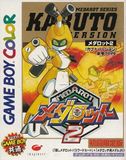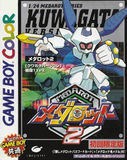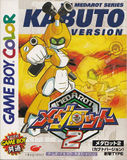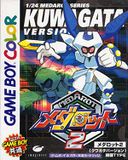Medarot 2: Difference between revisions
(Added a "Box Art" section) |
(Added some navigation links and made the gallery more compact.) |
||
| Line 4: | Line 4: | ||
| name-r = Medarotto 2 | | name-r = Medarotto 2 | ||
| image = Medarot 2 Kabuto Box.jpg | | image = Medarot 2 Kabuto Box.jpg | ||
| genre = | | genre = RPG | ||
| platform = Game Boy / GBC | | platform = Game Boy / GBC | ||
| developer = Natsume | | developer = Natsume | ||
| Line 30: | Line 30: | ||
* Medaforce | * Medaforce | ||
* New attacks | * New attacks | ||
* Medal natures | * Medal natures | ||
* Auto-battle feature | * Auto-battle feature | ||
| Line 40: | Line 39: | ||
* Some attack mechanics have changed | * Some attack mechanics have changed | ||
* You can no longer set the battle animation speed, but it's faster than in Medarot 1 | * You can no longer set the battle animation speed, but it's faster than in Medarot 1 | ||
== Limited edition release == | == Limited edition release == | ||
| Line 50: | Line 48: | ||
== Box Art == | == Box Art == | ||
<gallery widths= | <gallery widths=140 heights=160> | ||
File:Medarot 2 Kabuto Limited Box.jpg|Kabuto version (Limited edition) | File:Medarot 2 Kabuto Limited Box.jpg|Kabuto version (Limited edition) | ||
File:Medarot 2 Kuwagata Limited Box.jpg|Kuwagata version (Limited edition) | File:Medarot 2 Kuwagata Limited Box.jpg|Kuwagata version (Limited edition) | ||
| Line 59: | Line 57: | ||
== See also == | == See also == | ||
* [[Medarot 2 Parts Collection]] | * [[Medarot 2 Parts Collection]] | ||
* [[Medarot 2 (manga)]] | |||
{{game list links|Medarot 2|Medaforces}} | |||
{{Navbox-Game}} | {{Navbox-Game}} | ||
Revision as of 15:17, 13 June 2015
| Medarot 2 メダロット2 | |
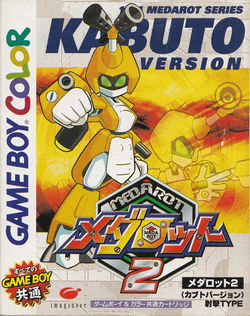
| |
| Genre | RPG |
|---|---|
| Platform | Game Boy / GBC |
| Developer | Natsume |
| Publisher | Imagineer |
| Release Date | July 23, 1999 |
Medarot 2 was released in 1999 for the Nintendo Game Boy. It's a direct sequel to Medarot 1, and follows the first adventures of Ikki Tenryou and his friends in the town of Omikuji. Unlike its predecessor, Medarot 2 can be played in full color on a Game Boy Color.
Like the other RPGs, the game was released in two versions where the main difference is the player's starting Medarot: Kabuto (Rhinoceros beetle, Metabee) and Kuwagata (Stag beetle, Rokusho). Along with the starting Medarots, there are some Medarots and Medals that can only be obtained in a specific version.
A remake of the game for Game Boy Advance, titled Medarot 2 Core, was released in 2002. While the remake saw releases in North America and Europe, the original Game Boy version of Medarot 2 has never been translated into English.
Selection of Medarots
- Main article: Medarots in Medarot 2
There were 91 new Medarots created for Medarot 2. The game also contains the 60 Medarots from Medarot 1, bringing the grand total up to 151. (The Medarots from the first game must be transferred from a copy of Medarot 1 after beating the game.)
New features / Differences from Medarot 1
In addition to being the first Medarot game in color, Medarot 2 has better graphics and several new features added. It's also backwards compatible with Medarot 1 after clearing the story.
New features
- Medaforce
- New attacks
- Medal natures
- Auto-battle feature
Other changes
- People now have face sprites when talking
- Changes to some Medals
- Some attack mechanics have changed
- You can no longer set the battle animation speed, but it's faster than in Medarot 1
Limited edition release
Limited editions of both versions of the game were released at the same time as the normal editions. The limited versions contained a random plastic Medal for use with the toy Medarotch, and a card listing the passwords to obtain the parts for Rappy in-game. The only difference was the extras in the box, and both editions contained the exact same game cartridge.
Both versions are still readily available second-hand, but it's common for limited editions to be missing their extras. The limited edition box art can be distinguished from the normal edition by a block of gold (Kabuto) or silver (Kuwagata) color behind the English title, as well as the Japanese text for "first edition" (初回限定版) near the bottom of the picture.
Box Art
-
Kabuto version (Limited edition)
-
Kuwagata version (Limited edition)
-
Kabuto version (Normal edition)
-
Kuwagata version (Normal edition)
See also
| Video Games View - Edit | |
|---|---|
| Main series / Parts Collections |
Medarot 1 (PC / PC2) - Medarot 2 (PC) - Medarot R (PC) - Medarot 3 (PC) - Medarot 4 Medarot 5 - Medarot DS - Medarot 7 - Medarot 8 - Medarot 9 |
| Side games | Medarot Navi - Shingata Medarot - Medarot S: Unlimited Nova |
| Remakes | Medarot Perfect Edition - Medarot 2 Core |
| Action games | Metabee Shot - Medarot G - Medabots AX - Medarot Brave - Medarot Dual - Medarot Girls Mission |
| Collections | Medarot Classics - Medarot Classics Plus |
| Other games | Medarot Cardrobottle - Pocket Robottle - Robattle 3D - Medarotch |
